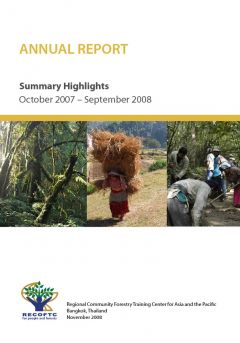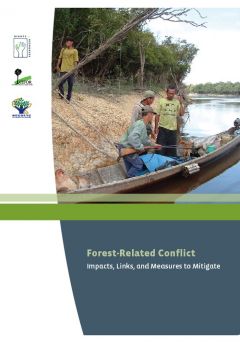Reducing forest emissions in the Amazon Basin: a review of drivers of land-use change and how payments for environmental services (PES) schemes can affect them
Si lo vieras con mis ojos: investigación colaborativa y cooperación con comunidades administradoras de bosques en Centroamérica
Tane' Olen sebagai Alternatif pengelolaan hutan: perkembangan lanjutan di Desa Setulang, Kalimantan Timur
Tenure Rights and Beyond: Community Access to Forest Resources in Latin America
This occasional paper is the result of research carried out from 2006 to 2008 on the effects of new tenure rights for forest-based communities in Latin America on access to forest resources and benefits. Focused on seven different regions in four countries, the paper examines changes in statutory rights, the implementation of those rights in practice, and the extent to which they have led to tangible new benefits from forests, particularly to new sources of income.
The role of informal institutions in the use of forest resources in Latin America
This study adopts an institutional approach to analyze the way in which informal rules, in their interaction with formal rules, shape the use of forest resources by diverse types of smallholders and communities (i.e., indigenous people, agro-extractive and traditional communities) in Latin America. Attention is given to understanding the ‘working rules’, comprising both formal and informal rules, that individuals use in making their decisions for land and forest resources access and use, which in turn affect benefits generation and distribution from such resources use.
Upaya-upaya baru membentuk interaksi pemerintah dan masyarakat
Dealing with the state, the market and NGOs : the impact of institutions on the constitution and performance of Community Forest Enterprises (CFE) in the lowlands of Bolivia
The overall objective of this research was to determine whether and how the institutional environment
influences the establishment and performance of Community Forest Enterprises (CFEs) in Bolivia.
This study defines CFEs as organizations that: (1) manage collectively owned forests in name of all
community members and (2) follow forest management regulations established by the 1996 Forest
Law. The theoretical point of departure for this research is that the institutional environment can
Governação Florestal em Niassa: o caso de Muembe, Sanga, Lago e Cuamba
A governação florestal em Moçambique é um tema de destaque nos últimos tempos. No final dos anos 90 e início de 2000 houve um movimento intenso no sector florestal para adequar as políticas e o quadro legal sobre a gestão de florestas. Este movimento contribuiu para alinhar as políticas nacionais com os padrões internacionais, particularmente sobre o desenvolvimento sustentável, a partilha de benefícios com as comunidades residentes na floresta, a contribuição do sector florestal para os Objectivos de Desenvolvimento do Milénio, entre outros.
RECOFTC Annual Report 2007-2008
The year 2007–2008 was the final year of the RECOFTC Program Phase 2004–2008. We are pleased to report that the four-year Program Plan was successfully implemented on time, and we fulfilled all the major remaining commitments, even exceeding targets in some areas. This is largely thanks to the generous financial support from the Swiss Agency for Development and Cooperation (SDC), the Swedish International Development Cooperation Agency (Sida), and the Norwegian Ministry of Foreign Affairs.
Forest-Related Conflict: Impact, Links, and Measures to Mitigate
Forest-based conflict is one of the major global challenges for the international forestry agenda together with poverty, climate change, conservation, and biofuels. In this paper, we will estimate the scope of the problem for people and forests, identify the role of forest rights and tenure as part of the cause of and solution to conflict, and project future challenges.





